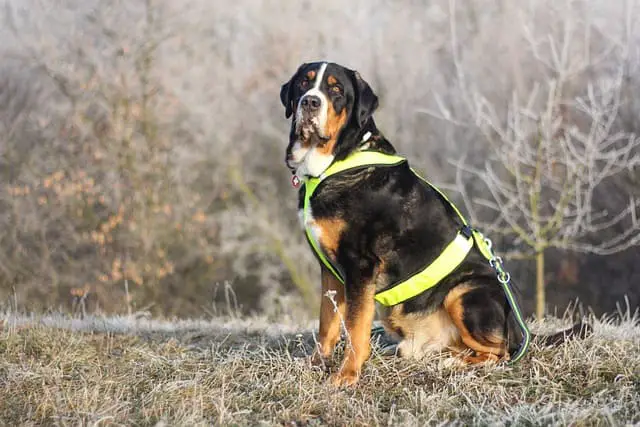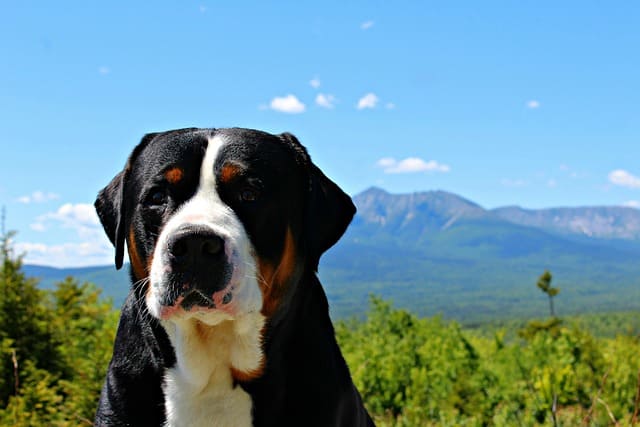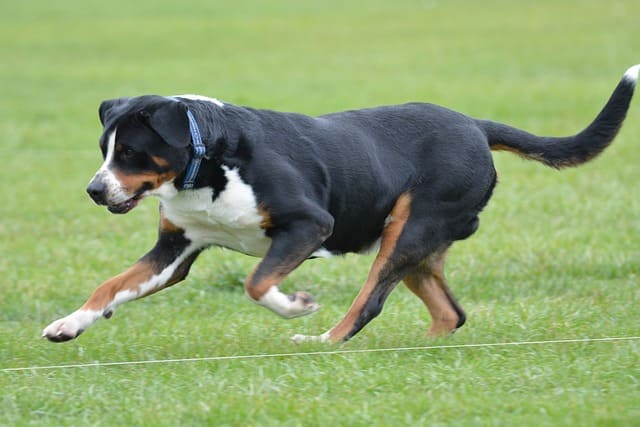Choosing the right dog breed is a significant decision that requires careful consideration of various factors, including your lifestyle, living situation, and personal preferences. The Greater Swiss Mountain Dog, often simply referred to as the “Swissy,” is a majestic and robust breed with unique characteristics. This breed is known for its strength, loyalty, and gentle temperament. In this comprehensive guide, we will explore the pros and cons of owning a Greater Swiss Mountain Dog, providing valuable insights to help you determine whether this breed aligns with your needs and expectations.
Pros of Owning a Greater Swiss Mountain Dog

1. Loyal and Devoted Companions
Greater Swiss Mountain Dogs are renowned for their loyalty and devotion to their families. They form deep bonds with their human counterparts and are known to be protective and caring. This breed is likely to become a steadfast and affectionate companion.
2. Good with Children
Swissies are generally good with children and have a reputation for their patience and gentle nature. They often take on a natural caretaker role within families and can be excellent playmates for kids.
3. Watchful and Protective
Greater Swiss Mountain Dogs are watchful and protective by nature. They tend to be alert and aware of their surroundings, making them reliable watchdogs. They will bark to alert their owners to any unusual activity or potential threats, providing an extra layer of security.
4. Calm and Stable Temperament
These dogs are known for their calm and stable temperament. They are typically even-tempered and good-natured, which contributes to a peaceful living environment. Their steady demeanor makes them easy to live with and enjoyable to be around.
5. Social and Friendly
Greater Swiss Mountain Dogs are usually social and friendly with both people and other animals. While they may be reserved with strangers, they tend to get along well with friends and family, which can make them excellent companions in multi-pet households.
6. Versatile Working History
The breed’s history as a versatile working dog is a significant advantage. While they are no longer used for working purposes as they were in the past, this heritage contributes to their strong and reliable nature. It also means they are adaptable and up for various activities and adventures.
7. Low Exercise Demands
Compared to many other large breeds, Greater Swiss Mountain Dogs have relatively low exercise demands. While they enjoy outdoor activities and playtime, they do not require excessive physical exertion. This feature makes them a suitable choice for individuals and families with a more relaxed lifestyle.
8. Family-Friendly
Their gentle and affectionate nature, combined with their good behavior around children, makes them a family-friendly breed. They are known for their patience and tolerance, making them wonderful pets for households with kids.
9. Adaptability
Greater Swiss Mountain Dogs are adaptable to various living environments. While they thrive in homes with ample space and access to a yard, they can adapt to apartment living, provided their exercise and mental stimulation needs are met. Their adaptability makes them suitable for different living situations.
Cons of Owning a Greater Swiss Mountain Dog

1. Size and Space
One of the primary challenges of owning a Greater Swiss Mountain Dog is their size. These dogs are large and robust, with adult males weighing between 140 to 155 pounds (64 to 70 kg) and adult females weighing between 110 to 120 pounds (50 to 54 kg). Their size can be a limiting factor for individuals living in small spaces or apartments.
2. Shedding
Greater Swiss Mountain Dogs have a dense double coat that sheds. While their grooming needs are manageable, their shedding can be a concern for individuals who prefer a low-shedding breed or have allergies. Regular brushing can help reduce shedding, but it is an inherent characteristic of the breed.
3. Watchfulness
While their watchful and protective nature is a pro in terms of security, it can also be a con. These dogs may bark at various stimuli, including noises and people passing by, which can be bothersome for neighbors or those seeking a quieter living environment.
4. Drooling
Many Greater Swiss Mountain Dogs are prone to drooling, particularly after eating and drinking. This can be a significant drawback for individuals who are particular about cleanliness and maintaining a tidy home. Managing drool may require frequent cleaning and the use of drool towels.
5. Short Lifespan
Greater Swiss Mountain Dogs have a relatively short lifespan compared to smaller breeds. On average, they live between 8 to 10 years. This shorter lifespan means that you’ll need to be emotionally prepared for the eventual loss of your beloved pet.
6. Grooming Needs
While their grooming needs are generally manageable, their dense double coat requires regular brushing to prevent matting and shedding. The breed’s shedding can be a challenge for individuals who prefer a low-shedding breed.
7. Hip Dysplasia
Greater Swiss Mountain Dogs are prone to hip dysplasia, which is a common orthopedic condition in larger breeds. Responsible breeding practices can help reduce the risk of hip dysplasia, but it is a health concern to be aware of.
8. Elbow Dysplasia
Elbow dysplasia is another orthopedic condition that can affect this breed. It can cause lameness and discomfort, and regular veterinary check-ups are essential to monitor and address elbow dysplasia.
9. Bloat (Gastric Torsion)
Bloat, also known as gastric torsion, is a life-threatening condition that can affect Greater Swiss Mountain Dogs. It is essential to be aware of the symptoms and seek immediate veterinary attention if you suspect bloat. Their deep-chested build makes them more susceptible to this condition.
Is a Greater Swiss Mountain Dog Right for You?
Determining whether a Greater Swiss Mountain Dog is the right fit for your family and lifestyle involves a careful evaluation of your living space, tolerance for size and shedding, willingness to address grooming and drooling, and commitment to their health and well-being.
Consider the following:
- Space: Do you have the space to accommodate a large breed dog like the Greater Swiss Mountain Dog? Their size and exercise needs may require more room.
- Grooming Commitment: Are you willing to commit to regular grooming, including brushing and shedding management?
- Tolerance for Drooling: Can you tolerate the breed’s propensity for drooling, particularly after eating and drinking?
- Health Awareness: Are you aware of the potential health concerns that can affect this breed and willing to invest in regular veterinary check-ups and preventative care?
- Loyalty and Protectiveness: Are you seeking a loyal and protective companion who will be a devoted member of your family?
- Good with Children: Do you have or plan to have children? Greater Swiss Mountain Dogs are typically good with kids and can be wonderful family pets.
- Adaptability: Can you provide the necessary exercise and mental stimulation, even if you live in an apartment or a smaller living space?
- Quiet Living Environment: Are you seeking a quiet living environment, or are you tolerant of the breed’s watchfulness and occasional barking?
If you find that your lifestyle aligns with the pros and cons of owning a Greater Swiss Mountain Dog and you are willing to address their specific needs, this breed can become a loyal and loving addition to your family. With the right care, attention, and a commitment to grooming and exercise, a Greater Swiss Mountain Dog can offer years of companionship and the joy of having a devoted and gentle pet by your side.
Conclusion

The Greater Swiss Mountain Dog, with its majestic appearance and gentle temperament, is a breed that captures the hearts of many dog enthusiasts. Their history as Swiss working dogs and their reputation as loyal and protective companions make them a valuable addition to the lives of those who appreciate their qualities.
Before bringing a Greater Swiss Mountain Dog into your life, carefully consider your living space, exercise and grooming capabilities, and willingness to provide for their needs. With the right match, a Greater Swiss Mountain Dog can become a devoted and loving member of your family, offering years of companionship, loyalty, and the joy of having a steadfast and affectionate pet by your side.
